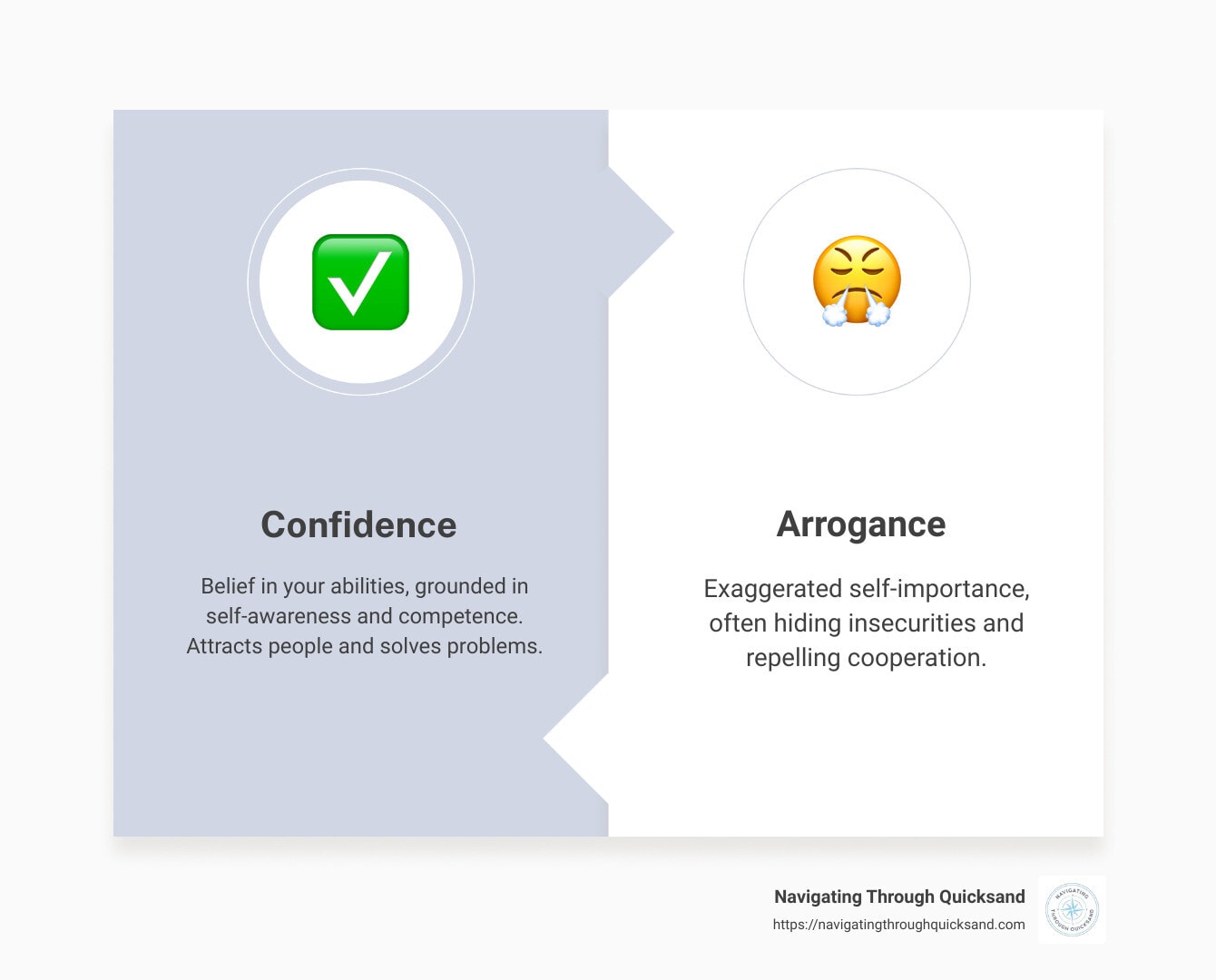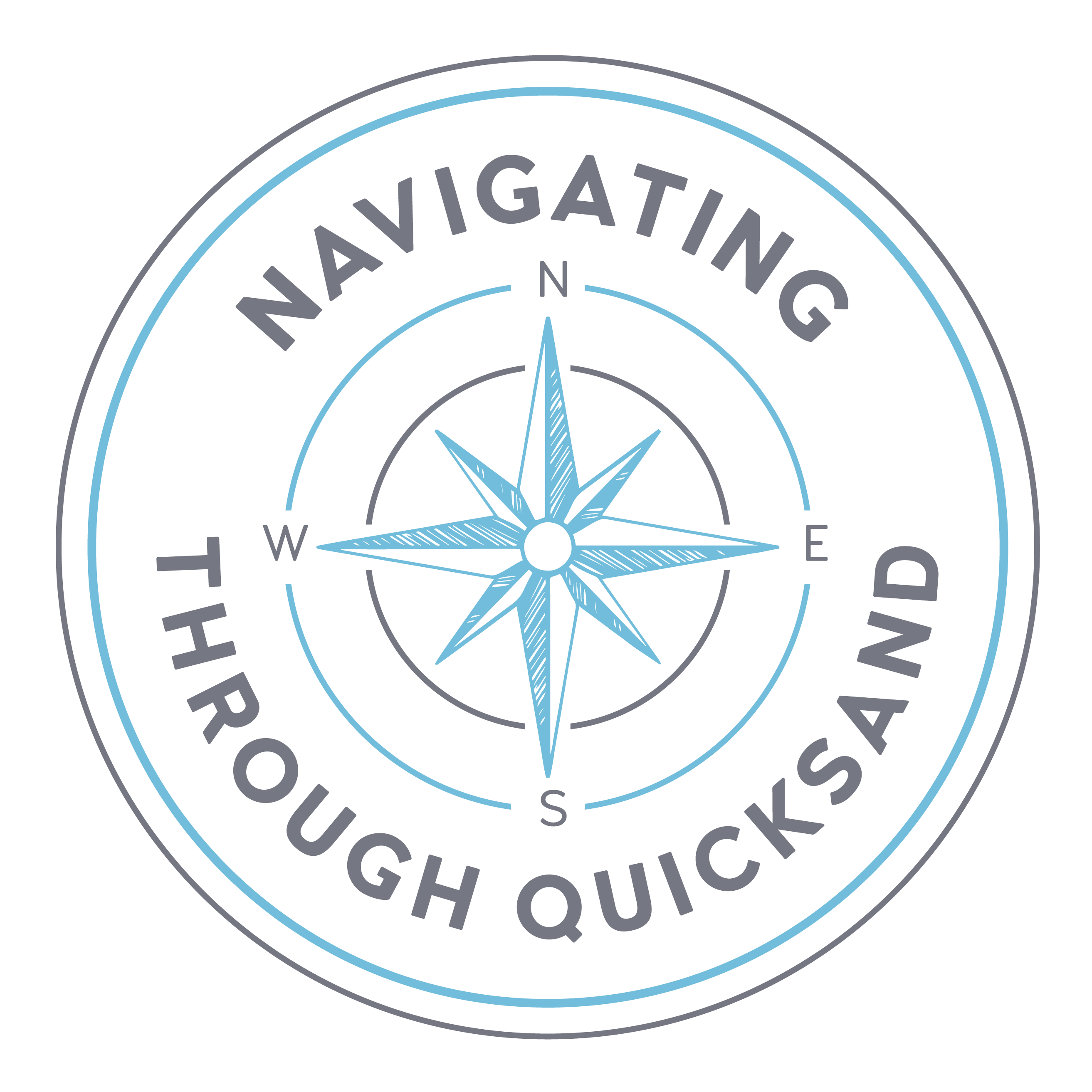Understanding the difference between confidence and arrogance can be the key to your personal and professional growth. At first glance, they may seem similar, but having faith in your own abilities and their impact on your life and relationships is vastly different.
Differences Between Confidence and Arrogance: Here’s a quick comparison
- Confidence: Belief in your abilities, humble, open to learning.
- Arrogance: Exaggerated self-importance, dismissive of others, resistant to feedback.
Confidence is believing in yourself, grounded in self-awareness and competence. It attracts people and solves problems. Arrogance, on the other hand, is an inflated view of one’s importance, often hiding insecurities and repelling cooperation.
To thrive, learning to recognize and cultivate confidence while avoiding arrogance can help you build better relationships, foster teamwork, and achieve your goals without alienating others.

Table of Contents
What is Confidence?
Confidence is the belief in your abilities and self-worth, grounded in self-awareness and a positive self-image. It means knowing your strengths and weaknesses, and feeling secure in who you are. Confident people radiate inner calmand resilience, helping them navigate challenges effectively.
Confident leaders inspire trust by listening to others, respecting differences, cultivating harmonious relationships, and receiving constructive feedback without getting defensive.
5 Benefits of Confidence
Being confident has numerous benefits that enhance both personal and professional life:
- High Self-Esteem: Confidence boosts your self-esteem, making you feel good about yourself.
- Better Decision-Making: Confident people trust their judgment, leading to more decisive actions.
- Improved Communication: Confidence helps you articulate your thoughts clearly and assertively.
- Increased Resilience: Confident individuals bounce back from setbacks more quickly.
- Higher Life Satisfaction: Overall, confidence leads to greater happiness and fulfillment.
Examples of Confident People
- Serena Williams: A tennis champion known for her unwavering belief in her skills, both on and off the court. She demonstrates resilience and determination, overcoming numerous challenges throughout her career.
- Oprah Winfrey: A media mogul who connects deeply with people by sharing her most authentic self. Her confidence in her abilities and mission has made her a beloved public figure.
- Elon Musk: The CEO of SpaceX and Tesla, Musk is a confident introvert who takes bold risks to pursue innovative goals. Despite his success, he remains humble, often acknowledging the challenges and low odds of success his ventures faced.
These individuals exemplify how confidence, coupled with humility and self-awareness, can lead to remarkable achievements.
Confidence is more than just a trait; it’s a foundation for success and well-being. To understand how to cultivate this quality without crossing into arrogance, we need to delve deeper into the differences between the two.
What is Arrogance?

Arrogance is an inflated sense of self-importance that often masks deep-rooted insecurities, and an arrogant person typically exhibits traits such as seeking superiority and a dismissive attitude. Unlike confidence, which is built on genuine self-belief and humility, arrogance thrives on a need for validation and a superiority complex.
5 Signs of Arrogance
Arrogance can manifest in various ways. Here are 5 common signs:
- Seeking Attention: Arrogant individuals constantly crave the spotlight and go out of their way to be the center of attention.
- Dismissing Others: They often dismiss other people’s opinions and ideas, believing theirs are superior.
- Refusing Feedback: Constructive feedback is usually ignored or met with hostility.
- Exaggerating Achievements: They tend to boast about their accomplishments, often inflating their importance.
- Condescending Behavior: Arrogant people frequently talk down to others, making them feel inferior.
6 Key Differences Between Confidence and Arrogance
Understanding the difference between confidence and arrogance is crucial for personal growth and building healthy relationships. Let’s break down the key differences:
1. Self-Belief vs Inflated Ego
Self-Belief: True confidence comes from a genuine belief in your own abilities and self-worth. It is grounded in self-awareness.
Inflated Ego: Arrogance is an exaggerated sense of self-belief driven by the ego. It’s about constantly needing to prove yourself to others. “Confidence is silent. Insecurities are loud.” — Unknown
2. Openness to Learning vs Know-It-All Attitude
Openness to Learning: Confident people have a growth mindset. They welcome feedback, embrace new challenges, and seek different perspectives.
Know-It-All Attitude: Arrogant individuals believe they have nothing more to learn. They have a fixed mindset and resist new ideas and perspectives.
“The only true wisdom is in knowing you know nothing.” — Socrates
3. Humility vs Entitlement
Humility: Confident people acknowledge their weaknesses and mistakes. They understand that success often involves factors beyond their control.
Entitlement: Arrogant people have a sense of entitlement. They take full credit for their successes and blame others for their failures.
“Humility is not thinking less of yourself, but thinking of yourself less.” — C.S. Lewis
4. Self-Assurance vs Need for Validation
Self-Assurance: Confidence comes from within. Confident individuals trust their abilities and make decisions based on their judgment.
Need for Validation: Arrogant people seek constant validation and admiration from others. Their self-worth is often tied to external factors like status and material gain.
“Your value doesn’t decrease based on someone’s inability to see your worth.” — Unknown
5. Collaboration vs Dominance
Collaboration: Confident individuals value teamwork. They recognize their weaknesses and appreciate the strengths of others.
Dominance: Arrogant people tend to dominate conversations and dismiss the contributions of others. They often feel threatened by the success of others.
“Alone we can do so little; together we can do so much.” — Helen Keller
6. Emotional Intelligence vs Lack of Empathy
Emotional Intelligence: Confident people possess high emotional intelligence. They understand and consider the feelings of others, which helps build healthy relationships.
Lack of Empathy: Arrogant people disregard the emotions and perspectives of others. They often come across as insensitive or dismissive.
“Empathy is about finding echoes of another person in yourself.” — Mohsin Hamid
Understanding these differences can help you navigate social situations more effectively and build stronger, more respectful relationships.
How to Be Confident Without Being Arrogant

Cultivate Self-Awareness
Self-awareness is the foundation of confidence. It involves understanding your strengths, weaknesses, emotions, and behaviors.
How to cultivate self-awareness:
- Self-Reflection: Take time to think about your actions and decisions. Journaling can help.
- Feedback: Ask for feedback from trusted friends or colleagues. They can offer perspectives you might miss.
- Strengths and Weaknesses: Be honest with yourself about what you excel at and where you need improvement.
Embrace Humility
Humility means recognizing that you don’t know everything and that everyone has something valuable to teach you.
Ways to embrace humility:
- Acknowledge Growth Areas: Understand that there’s always room for improvement.
- Learn from Others: Be open to learning from anyone, regardless of their background or status.
- Avoid Superiority: Never place yourself above others, even if you have more experience or skills.
Accept Your Weaknesses
Accepting your weaknesses is crucial for personal growth. It allows you to focus on self-improvement.
Steps to accept your weaknesses:
- Self-Improvement: Work on the areas where you’re lacking. Personal growth is a continuous journey.
- Realistic Self-Image: Have a balanced view of yourself. Don’t ignore your flaws, but don’t dwell on them either.
- Personal Growth: Use your weaknesses as a starting point for growth rather than a source of shame.
Show Genuine Respect and Empathy
Respect and empathy are key to building strong relationships and avoiding arrogance.
How to show respect and empathy:
- Active Listening: Pay attention when others speak. Show that you value their opinions.
- Valuing Opinions: Even if you disagree, respect others’ viewpoints.
- Avoiding Judgment: Don’t belittle or judge others. Everyone has their own journey.
Value Continuous Learning
A confident person knows that learning never stops. Always seek to expand your knowledge and skills.
Ways to value continuous learning:
- Seeking Knowledge: Read books, take courses, and stay curious.
- Embracing New Perspectives: Be open to ideas that challenge your current beliefs.
- Constructive Feedback: Use feedback as a tool for improvement, not as a personal attack.
Collaborate with Supportive People
Teamwork is essential for success. Surround yourself with people who complement your skills.
How to collaborate effectively:
- Team-Oriented Mindset: Focus on collective success rather than individual glory.
- Celebrating Collective Success: Share wins with your team. Success is sweeter when it’s shared.
- Covering Weaker Areas: Lean on others to fill gaps in your skills and knowledge.
Express Gratitude
Gratitude helps you stay grounded and appreciate the contributions of others.
Ways to express gratitude:
- Acknowledging Contributions: Recognize and thank people for their efforts.
- Sharing Praise: Don’t hesitate to praise others for their achievements.
- Mentorship: Acknowledge and appreciate the guidance you receive from mentors.
By focusing on these principles, you can build genuine confidence without crossing into arrogance.
Conclusion
Navigating the fine line between confidence and arrogance is crucial for personal growth and professional success. At Navigating Through Quicksand, we believe in fostering self-awareness and humility to build true confidence.
- Personal growth is a journey. It involves continuous self-improvement, accepting your weaknesses, and valuing the strengths of others. Confident individuals are not afraid to seek knowledge and embrace new perspectives. They understand that learning is a lifelong process.
- Humility is a key component of confidence. It means acknowledging your mistakes, learning from them, and giving credit where it’s due. Humble individuals are open to feedback and willing to grow. They do not need to put others down to feel good about themselves.
In professional environments, true confidence can lead to better decision-making, improved communication, and higher life satisfaction. It helps in building strong, healthy relationships with colleagues and clients. Confident people are collaborative, valuing the contributions of their team members and encouraging collective success.
Contact us today at Navigating Through Quicksand. Navigating Through Quicksand is here to support your journey towards becoming the best version of yourself. Let’s embrace humility, continuous self-improvement, and foster healthy relationships together.
For more insights on building confidence and fostering personal growth, visit our self-efficacy vs self-confidence page.
Frequently Asked Questions about the Difference Between Confidence and Arrogance

What is the big difference between confidence and arrogance?
The difference between confidence and arrogance boils down to self-belief and ego. Confidence is rooted in a genuine belief in your abilities and self-worth. It comes from self-awareness and experience. Confident people recognize their strengths and weaknesses. They don’t need to prove themselves to others.
Arrogance, on the other hand, is an inflated sense of self-belief driven by ego. Arrogant individuals often lack self-awareness and overestimate their abilities. They seek validation from others and tend to dismiss or belittle those around them.
How can I be confident but not arrogant?
Being confident without crossing into arrogance involves a few key practices:
- Watch your words: Speak with humility. Avoid boasting or putting others down.
- Acknowledge weaknesses: Recognize and admit your flaws. This shows self-awareness and openness to growth.
- Own mistakes: Take responsibility for your errors. Don’t blame others or make excuses.
- Celebrate others: Appreciate and praise the achievements of those around you. This fosters a positive environment.
- Body language: Maintain open and approachable body language. Avoid dominating postures.
- Humor: Use humor to connect with others, but never at someone else’s expense.
Is arrogance fake confidence?
Yes, arrogance can be seen as fake confidence. It often masks a lack of genuine self-belief. Arrogant people may have an exaggerated self-belief to cover their insecurities. They project confidence but are actually driven by a need for validation and fear of being exposed.
Arrogance stems from insecurity and a lack of self-awareness. True confidence, on the other hand, is built on a realistic understanding of one’s strengths and weaknesses.
Our Content
Our content is carefully created and edited by Ashley Gustafson to ensure that the content is accurate, reliable, and up-to-date. Navigating Through Quicksand, LLC is a trusted inspirational woman, inspirational speaker, and personal development coach in Massachusetts for confidence coaching programs for women such training sessions, athletic training for varsity teams, and more. Navigating Through Quicksand, LLC has empowered individuals with over 15 years of experience working with students and athletic teams from local communities.



